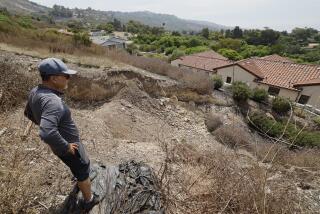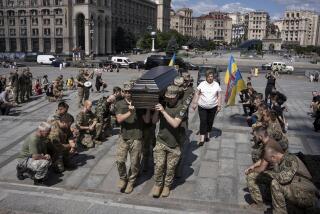Kuwait to Lack Water, Power for 3 More Weeks
- Share via
KUWAIT CITY — Electricity and water service will likely be delayed for another three weeks to much of Kuwait, government officials said Saturday, raising the tension in an already taut capital on the eve of the Muslim holy fasting month of Ramadan.
As the country prepared today for Islam’s traditional period of fasting, celebration and renewal, frustrations over the lack of any basic services since the liberation of Kuwait continued to worsen the uncertain political climate.
Opposition spokesmen and former Kuwaiti resistance leaders, pointing to bread, water and dry goods lines that stretch through many areas of the city, are raising questions about the ability of the emir’s returning government to take control of the country.
Meanwhile, a government crackdown on suspected collaborators with the former Iraqi regime has led to widespread arrests and reprisals that have left at least 12 Kuwaiti soldiers dead or wounded and perhaps hundreds of Palestinians and North Africans under arrest, some allegedly beaten or tortured.
The lack of running water, electricity and telephone service in most sections of the country has fueled the rising unease. Saturday’s announcement that improvements cannot be expected for another three weeks could not have come at a worse time.
The month of Ramadan is a time when most Muslim families fast by day but stay up celebrating until all hours of the night--a difficult feat in a city that is short of food, nearly out of candles and running on dwindling supplies of lantern fuel.
And it now appears unlikely that Kuwait will open its doors to exiled Kuwaitis--hundreds of thousands of whom are waiting in foreign capitals for permission to return--in time to join their families for the traditional feast that marks the conclusion of Ramadan.
“The war, the fear, we managed. But this is worse,” said Lucine Taslakian, a nurse at Ahmadi Hospital. “Day by day, we are getting more tired, we are getting more nervous. . . . You can’t cook, you can’t wash, you can’t sleep. Seven months we lived like hostages, and now we are like prisoners here.”
“We waited for the liberation, and what we found was a big, fat zero that they came up with,” said Faisal Marzook, a banker, merchant and former resistance worker.
“During the occupation, we distributed food, we distributed money, we had clinics in the residential areas, and now they want to take everything and start it all over again, and I think it’s disgusting,” he added. “They came into Kuwait with vengeance and hatred for the Kuwaitis who remained behind.”
Reprisals against foreigners believed to have collaborated with the Iraqis have apparently been stepped up. Another busload of 31 Palestinians and North Africans, some complaining of rough treatment, was dumped by Kuwaiti military authorities Saturday across the border in Safwan, Iraq, a human rights worker said. At least two other busloads were deposited earlier in the week in what human rights officials say is an apparent violation of international law.
In a city operated under martial law, the sweeps, formerly confined largely to street checkpoints and Palestinian neighborhoods, have become more blatant. Three Palestinian employees of one of the only three hotels operating in the city, including the manager, were publicly arrested this week, apparently based on uncertain accusations of sexual activity during the occupation.
At a hotel across town filled with Western journalists, a man found with an Iraqi gas mask in his car was publicly hogtied, kicked and carried off by Kuwaiti authorities.
Kuwaiti and Western authorities here admit the situation is uncomfortable but say that most of the tension is likely to dissipate once electricity and water service are restored to Kuwait city.
Officials had initially predicted that it would take two weeks to restore full electricity service to the city, a prerequisite to pumping water from the reservoirs to homes, hotels and offices.
But in a news conference Saturday, Electricity and Water Minister Himoud Abdullah Rakbah said it is proving more difficult than expected to restore power lines between Kuwait city and the country’s only fully functioning power plant at Ras al Zour, 56 miles to the south.
A total of 250 workers are working full-time on a $16-million project to repair more than 200 breaks in the two lines that need to be functioning to provide electrical service to the country, Rakbah said, but he could not guarantee the work will be finished for another three weeks.
“I can assure you within three weeks, before three weeks, things will be restored almost to normal,” he said. “We appreciate the people, they’ve been suffering for seven months now under the occupation, and we do appreciate the suffering of the lack of electricity and water. . . . We hope that it will not take that long.”
Among factors complicating the problem, he said, are that a large number of the country’s electrical substations have been damaged and that Iraqi-planted bombs had to be removed from several of the power plants before restoration work could begin.
In fact, American contract workers stringing the power lines between Ras al Zour and the capital say many of the breaks were apparently caused not by the Iraqis but by allied bombers. Under many of the breaks, there are Iraqi tanks and bomb craters, they said.
But Rakbah said that most of the country’s power generation and water desalination facilities were indeed blown up by Iraqi troops as they fled Kuwait for Baghdad late last month.
More to Read
Sign up for Essential California
The most important California stories and recommendations in your inbox every morning.
You may occasionally receive promotional content from the Los Angeles Times.













